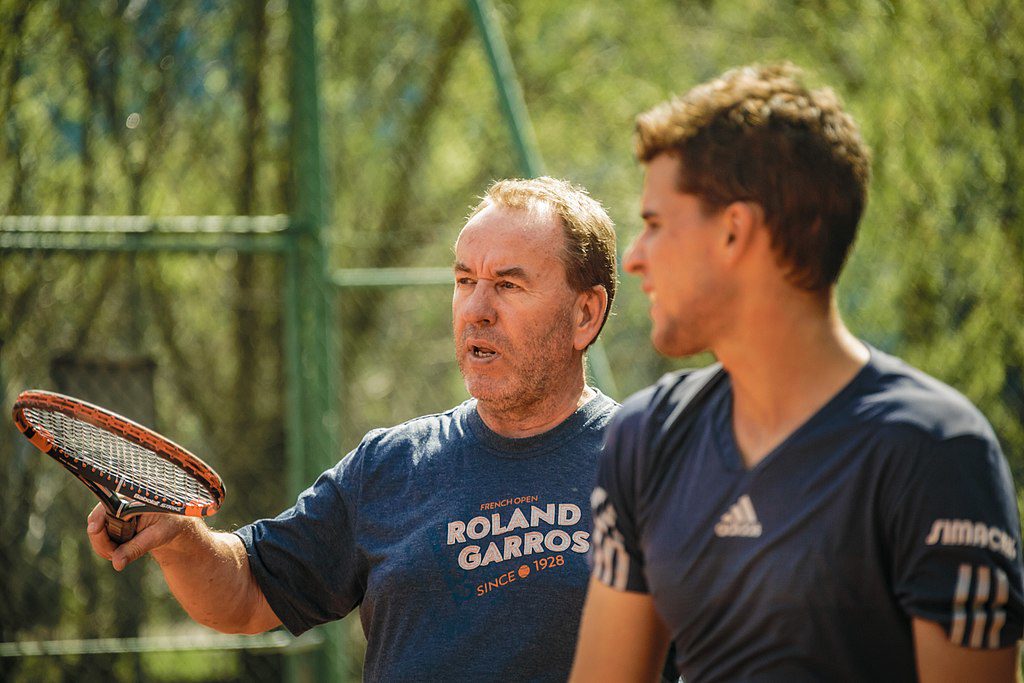“You Can Only Be A Good Coach If You Are A Good Person.”
A couple of years ago in 2014, I was very fortunate to interview the world-famous tennis coach, Günter Bresnik during the Tennis Classics in Budapest. I would like to share some of his great insights on coaching in this blog post.
Tennis Classics is organized every year in Budapest by Balazs Taroczy, the former Hungarian Wimbledon doubles champion who has achieved ATP singles ranking of World No. 12. He is a big supporter of Hungarian tennis and invites great tennis legends every year. While I was at the event, I had the opportunity to interview the world-famous tennis coach, Günter Bresnik. Günter is a former coach of many prominent players. Just to name a few are Boris Becker, Amos Mansdorf, and Patrick McEnroe.
At the time in 2014, he was coaching the Austrian Dominic Thiem, who is currently ranked No. 7 in singles by the ATP (in 2014, he was the youngest player in the top 50 in singles) and the Latvian Ernests Gulbis who is currently ATP’s No. 189 (in 2014, he was ranked No. 10 in singles). Dominic and Ernest played the final against each other in the exhibition and Ernest won the match. Following the match, Günter gave me his insight on coaching. During our conversation, he made it clear to me that he was not a big fan of mental coaches and tries to stay away from them. Nevertheless, we had a great discussion, and I really enjoyed the conversation with him. Some of which I would like to share with you:
What’s your coaching philosophy?
I believe that you can only be a good coach if you are a good person. I am inspired by the philosophies of existential theorists, Viktor Frankle and Hermann Hessen. Of course, there are always exceptions, and there are good coaches who are not great people, but in the long run, this matters the most.
Do you believe in talent? How do you choose your players?
I don’t believe in talent, rather I believe in space repetition. It’s all about how much time the student put into practice and how much quality of work a player does.
I believe in work ethic and the motivation of my players rather than in talent skills. My players have to have the willingness and resilience to do whatever it takes to be successful on the court, and this comes through hard work. Coaches don’t choose their players in tennis. The players choose their coaches. Yet, I have to know my player inside and out to be able to work together with him fully. There is not even a 5 percent of hiding. The player has to be 100 percent open to working with his or her coach at the highest level. You can learn the most about your player off the court. For example, going to see a movie or spending time together besides training and know how they behave off the court.
What do you think about mental coaching?
I have had some bad experiences with mental performance coaches. They are not effective if they are trying to teach by simply telling players what to do. It has to happen through facilitation rather than teaching. Mental performance coaches also often don’t understand everything in tennis. And in cases where a player is a more sensitive type, too much self-awareness can actually be detrimental if focusing on one’s self is not done appropriately. Mental coaches have to understand this and also use their intuition. They can do more harm than good when trying to teach routines to players. For instance, at the highest level in the case of in-between points, the routine happens intuitively, and it’s not at all helpful to bring it to the players’ attention. Their individual routine has been clearly working naturally, and there is no need to change it to a more generic routine. The goal is to facilitate the creation of your players’ personality and style. Forcing any style on them is counterproductive.
What do you think about self-confidence?
There is a cultural difference between America and Austria/Germany in parenting which affects the kids’ self-confidence. Austrian and German parents are focusing on what the kids can’t do before, during, and after a match. Exactly the opposite happens in America because the kids only get positive feedback from their parents. This affects the kid’s self-confidence differently, and any extreme is bad. I believe in the encouragement and education of the student through practice rather than theory. Practice is the best teacher. We have to teach the kids that when they fail, they have to get up and just keep going, and not to give up. This attitude is forged in early childhood and it’s very important.
Gunter Bresnik’s advice for coaches is that you always have to formulate and deliver your message in a positive way by highlighting for your players what they can instead of what they can’t do. Encouragement is extremely important.
Bresnik was using different coaching styles with Dominic Thiem and Ernest Gulbis. Dominic did everything he was told and was very easy to coach. Ernest tended to get bored more easily, so coach Bresnik had to be more creative to keep things interesting. There is no good or bad, it is just that everybody is different. 🙂 Personally, I share Gunter’s philosophy about not focusing only on the outcome, ‘Be No 1 in the world’. Rather, I focus on the specific ways in which a player can improve his/her physical, mental, and technical skills, etc., and I know the result will come.
Always adjust your coaching style to your player!
Click here to get a copy how to Get Your Game Face On Like The Pros! to learn how to be mentally tough when you need it the most and learn about mental game. Also, if you have questions or comments please don’t hesitate to send me an email at dora@dorakurimay.com

